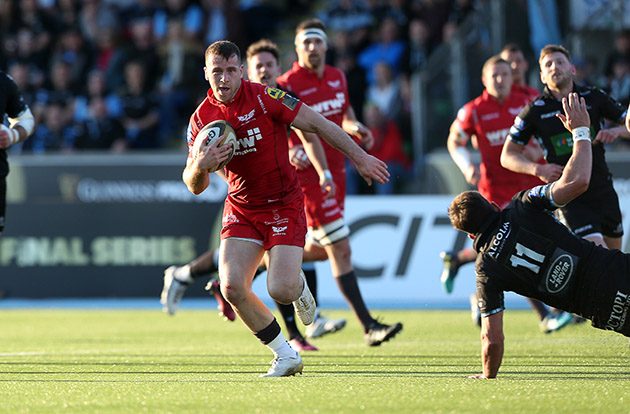This is the first season of the new Guinness Pro14 play-off structure, but is it flawed given the long breaks for the top teams?
Does the Guinness Pro14 play-off structure need changing?
The Scarlets were deserving winners in the first of this season’s Guinness Pro14 semi-finals, their clinical edge in attack resulting in a 28-13 victory over Glasgow Warriors at Scotstoun.
The home fans may have directed their ire at referee John Lacey but the Warriors’ defence made things easy for the Scarlets at times while the hosts’ willingness to kick ball away also played into the hands of the defending champions. The Scarlets took their chances; Glasgow did not.
Yet one thing that may be looked at in closer detail over coming weeks is the fact that Glasgow, who had been the pacesetters in the Pro14 for much of the season, had a three-week break between the last round of the regular season and their semi-final.

Long wait: Glasgow Warriors hadn’t played for three weeks before the semi-final (Inpho)
Did securing a route direct to the last four actually hinder, rather than help, their chances? Perhaps it isn’t a ‘reward’.
Let’s look back to when play-offs were first introduced to determine the winners of the English Premiership. The initial structure in 2002-03 saw the table toppers progress straight to the final, where they faced the winner of a play-off between the second- and third-placed teams.
Gloucester had led the way that season but were thrashed 39-3 by Wasps in the final. The Cherry and Whites hadn’t played for three weeks.
The same happened the following season: Bath finished top of the table but Wasps beat them in the final. Leicester suffered the same fate in 2005 too.
So come the 2005-06 season, the top four teams made the semi-finals – first playing fourth and second playing third – so there was no huge break before the final for the top team.

Falling short: Gloucester were beaten by Wasps in the 2003 Premiership final (Getty Images)
With two conferences brought in this season, the Pro14 structure sees the winners of each conference progress straight to the semi-finals while second in one conference plays third in the other.
This does make sense, but if that enforced break between matches is adversely affecting those top performers, it needs to be looked at – just as the Premiership had to address the issue more than a decade ago.
Obviously, this is not the sole reason Glasgow lost their last-four tie against Scarlets – their form has dipped in the past couple of months and they were outplayed by the Scarlets on Friday night – but a three-week game between matches doesn’t help a team regain their form either.
This is top quality stuff from Scarlets. Three weeks off at this time of year has done Glasgow no favours. #GLAvSCA
— Paddy O'Brien (@Padzelli) May 18, 2018
It’s a little different for Leinster given they had the Champions Cup final to play in a week before their fixture against Munster, but if they hadn’t reached that stage of the European competition, would their performance have been affected?
Glasgow coach Dave Rennie said they “weren’t looking for excuses” and wouldn’t point the finger at the play-off structure. Yet if something similar happens next season the league’s hand may well be forced.
Let us know what you think of the Pro14’s play-off structure by emailing rugbyworldletters@timeinc.com
Follow Rugby World on Facebook, Twitter and Instagram.






